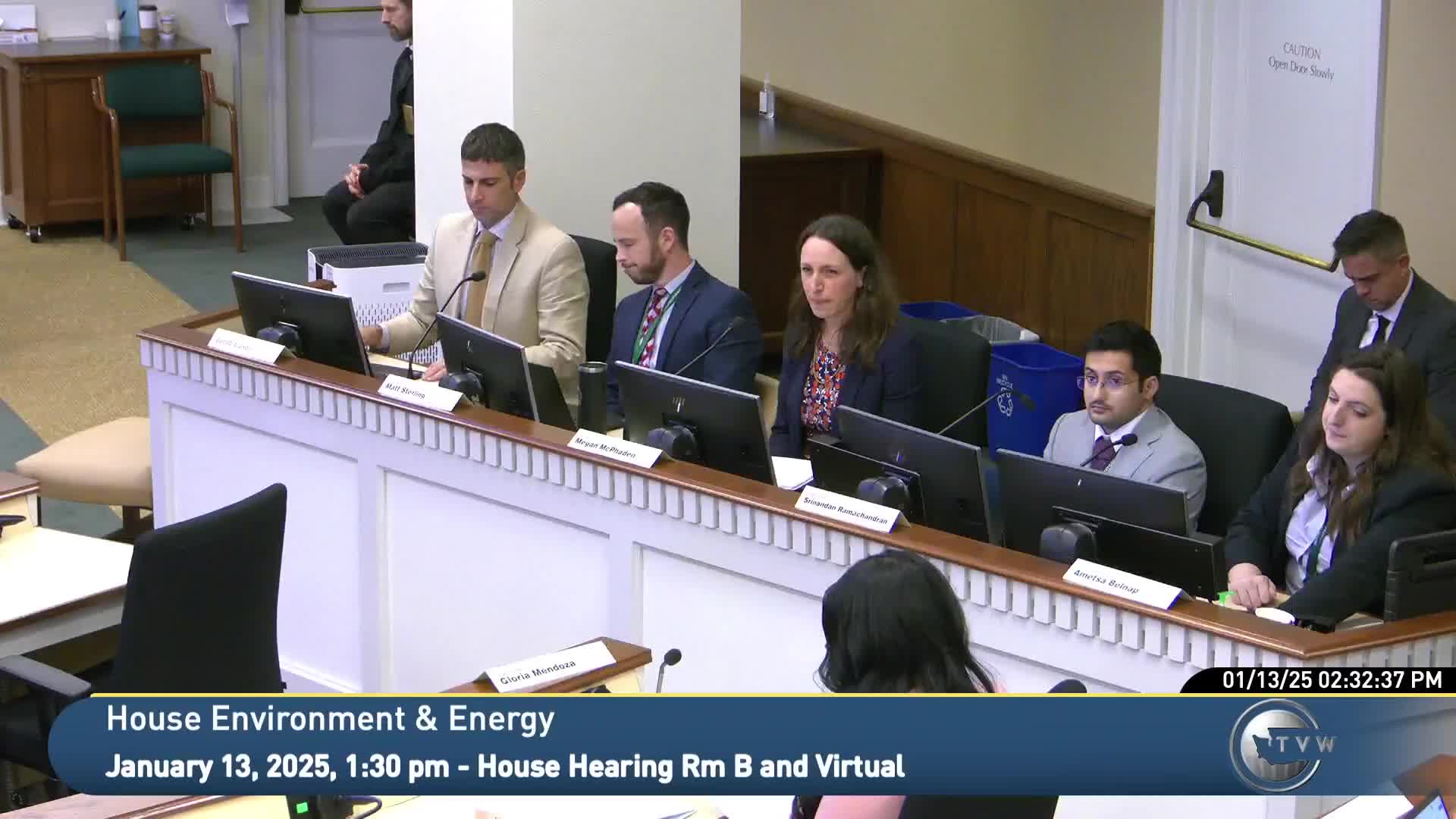Bill would require apparel makers to report chemicals, environmental impacts to Ecology
Get AI-powered insights, summaries, and transcripts
Subscribe
Summary
House Bill 1107, introduced to the Environment & Energy Committee by Representative Charlotte Mena, would require producers of apparel and footwear to begin annual reporting to the Washington State Department of Ecology beginning in 2027, including disclosures about regulated toxic chemicals, environmental claims used in marketing, how excess products are handled and firms’ current environmental activities and targets.
House Bill 1107, introduced to the Environment & Energy Committee by Representative Charlotte Mena, would require producers of apparel and footwear to begin annual reporting to the Washington State Department of Ecology beginning in 2027, including disclosures about regulated toxic chemicals, environmental claims used in marketing, how excess products are handled and firms’ current environmental activities and targets.
The bill targets four disclosure categories for most producers and adds further reporting for larger producers with $100,000,000 or more in annual worldwide gross income, including due-diligence outcomes, greenhouse gas data and recycled content. The bill also directs Ecology to carry out a two-part assessment — a preliminary 2026 review to consider extended producer responsibility and a public-facing platform, followed by a 2028 report on product-labeling recommendations — and authorizes Ecology rulemaking and limited exemptions for de minimis producers. Penalties for noncompliance would fund environmental-benefit projects in communities identified as overburdened by pollution.
Jacob Lipsen, nonpartisan committee staff, summarized the bill’s structure and timelines and said Ecology would be authorized to adopt rules that could exclude smaller producers. “Producers of fashion products must begin annually reporting information to the Department of Ecology beginning in 2027,” Lipsen said during the staff briefing.
Representative Charlotte Mena, the bill’s prime sponsor, framed the measure as a consumer-transparency and pollution-reduction step. “Fashion is a huge part of culture,” Mena said, noting the industry’s global resource use and waste. She cited United Nations and EPA figures on water use, carbon emissions and textile waste to argue the state lacks data to address harms and that the bill would “require companies to be honest about the chemicals that our bodies are exposed to when we wear their clothes.”
Supporters at the hearing urged passage as a first step toward accountability. Sherry Peel, market and government policy director for Toxic-Free Future, told the committee the bill would expand the reach of the Children’s Safe Product Act database beyond children’s apparel and help the public identify hazardous chemicals in clothing. “Many toxic chemicals are used in the fashion industry, but we do not currently have a way to understand which of these chemicals are present in the vast majority of the clothing that we wear,” Peel said. Catherine Horvath of the Washington Public Interest Research Group and Heather Trim of 0 Waste Washington also testified in favor, highlighting waste, greenhouse-gas and disposal concerns and urging the committee to adopt transparency measures similar to recently enacted policies in other states.
Several industry trade groups and retailers testified in opposition or with reservations. Crystal Leatherman, director of local and state government affairs for the Washington Retail Association, said the association’s members support sustainability but oppose HB 1107 as drafted because it would assign a state agency substantial responsibility for global supply-chain oversight and impose requirements on retail brands that may not control upstream manufacturers. “We must oppose HB 1107 as it presents significant challenges that could negatively impact Washington businesses and consumers,” Leatherman said. Peter Galewski of the Association of Washington Business and Brandon Huskeper of the Northwest Grocery Retail Association raised similar concerns about timelines for an extended producer responsibility (EPR) workstream, the bill’s interaction with the Safer Products for Washington program, and the potential for compliance costs to be passed to consumers.
Andrew Pappas of the American Apparel and Footwear Association urged the committee to consider models used in California, including SB 707 (textile EPR) and climate reporting work, and recommended a coordinated federal- or multi-state approach rather than a patchwork of state rules. Kimberly Getz, speaking for the Department of Ecology, said Ecology had signed in as "other" because the bill carries fiscal impacts not in the governor’s budget and because Ecology lacks specific expertise on multinational supply chains and some referenced standards; she recommended adjustments to the assessment timetable and involvement from the Department of Health for public-health analysis. “Ecology has little to no expertise in this particular area especially about the standards referenced in the bill,” Getz said.
A small number of members of the public opposed the bill on broader trade and shipping grounds. John Worthington of Sequim argued the measures would not address international shipping emissions and that Washington would not be able to cure worldwide supply-chain environmental harms by state law.
The committee limited public testimony to keep the hearing on schedule; staff noted they would accept amendment requests and proposed substitutes on a set timetable during the executive-session process. Testimony on HB 1107 closed and the committee moved on to the next bill; no formal vote or committee action on HB 1107 was recorded during the hearing.
Ending: HB 1107 drew a mix of support from environmental and waste-reduction advocates and concerns from retail and industry groups about feasibility, timelines and costs. Committee staff and Ecology recommended revisions to the bill language and timetable; sponsors said they will work with stakeholders on technical fixes and exemptions.
